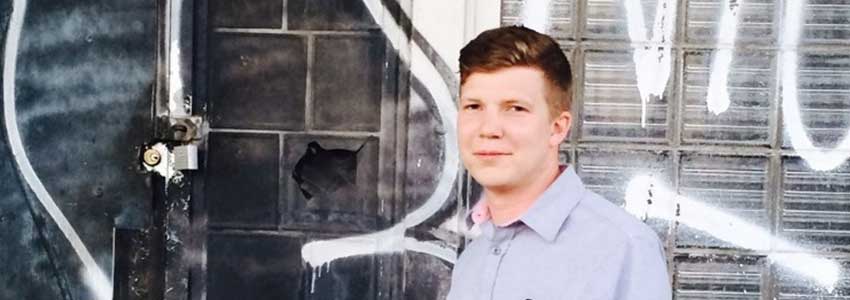Nick is a second year sociocultural anthropology student researching what happens to vacant and abandoned buildings in Detroit. He asserts, “I want to know what happens when people take them apart; the lives of the scrappers and recyclers involved, how things make their way in the world when a building dies. I want to understand the histories and narratives from that process.”

Scene from Detroit, “Will scrap for food”

Scene from Detroit, “Don't throw away a good thing. RECYCLE! Michigan”
“The ‘stuff’ is a way to find entry points to people. This is about more than Detroit and how parts flow into the global economy and community. I’m following the human narratives I couldn’t find otherwise.” Nick mentions former manufacturing workers whose job used to be putting stuff together and now find their skills used to deconstruct what others have made. Scrapping has become their career as the manufacturing base of the economy disappeared. He says, “Detroit didn’t fall out of the global economy; pieces of Detroit are being channeled there, albeit in a different way.”
“In the anthropology department, we undertake one year of long-term field work. Mine will be starting in Detroit and moving as I follow scraps wherever they go. It takes a lot of time and money to do this, and I’m very thankful for Rackham’s help. The institutional funding available here is crucial.”
Nick participated in a fellowship last summer with the Arts of Citizenship program. He recalls, “I was a fellow at U-M’s Detroit Center. I gathered oral histories from alumni in Detroit who are over 50 for the upcoming bicentennial. It was great to use interviews to give color to a tumultuous and productive part of the University’s history. It’s incredible how much people care about U-M.” This project helped inform Nick’s work and provided funding to do research in a scrap yard in Detroit as well. He says, “Arts of Citizenship is helping people in my role and field see that students like me are gaining real world skills and have viable career paths outside of academia. It can be difficult for faculty members to help us explore this. Arts of Citizenship helps navigate options for the future and how to think about my research in a different way and communicate it to alternate audiences. I’m understanding new ways to think about kinds of knowledge bases and skill sets and how that is useful in the world.”
His U-M story is a long one. As an undergraduate student at U-M, he studied anthropology and French literature. He remembers, “When I was a senior, I won funding to do a summer thesis in Detroit working with people who moved to Detroit from elsewhere. I was really interested in how people made social worlds around buildings.” After graduating, he worked in New York for a few years at the New School teaching social science to design students. “I wanted to make core competencies of the humanities matter to them. Then I started thinking about the processes of design and how that related to anthropology.”
Nick was accepted to a few schools and wasn’t sure he should return to his alma mater for his graduate studies. “I came for recruitment weekend and one of my faculty members talked about being a student in Berkeley from undergrad through Ph.D. and how it didn’t affect her options but was the right place for her to be. She told me that Michigan is where I needed to be to do the experimental work I wanted to do. She was right. This is a great interdisciplinary platform to do something that doesn’t really fit into any one program.” And he’s gained a new understanding of his old stomping grounds: “I thought I knew Ann Arbor, and I was so surprised to come back and find there are things to do west of Division Street. There are great distractions in Ann Arbor, but they’re not too great.”
He’ll spend his fourth year traveling and the following two years writing his dissertation. What form that will take is something he’s giving a lot of thought to. “I may write a book, or two books – one academic and one not, or may create gallery installations. I want to help my interlocutors and informants realize that the work they do is really important and affects the lives of other people.”
Outside of academia, Nick is an organizer for the Graduate Employee Organization (GEO) and likes helping identify and work through problems that graduate student employees experience. “It is great to meet graduate students outside of the seminar room. We can have a different fellowship, and an important one, there.”

